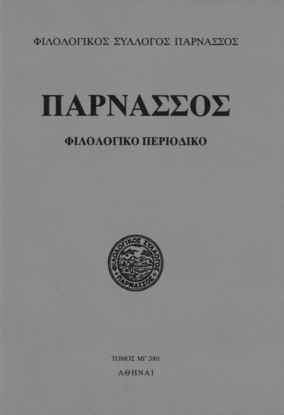Διορθωτικά και ερμηνευτικά σε αποσπάσματα του Δημόκριτου
Part of : Παρνασσός ; Vol.ΚΔ, No.1, 1982, pages 41-48
Issue:
Pages:
41-48
Parallel Title:
Emendations and interpretations of some Democritean fragments
Author:
Abstract:
In this work I attempt some emendations and interpretations of some Democritean fragments.Fr. 124 Diels-Kranz (= 525 Luria). I propose the following form: άνθρωπος εϊς εσται καί άρθρα πάντα. (Cf. Luc. Eun. 358, Herod. Ill 87, IV 2, Horn. E 60, I, 50). The fragment means that the sperm of the man is released from the whole body (cf. Galen, d. defin. med. 439).Fr. 182 DK (= 35 L). I propose the following form:(. ..) ουκω μεγάλης τε τής φυσικής έστοϋς. (Cf. DK 182 note: φυσικής έστοϋς, fr. 191, 252, 266, 285: οκως). So the fragment means that the man performs unbecoming acts before the complete formation of his character through education (cf. fr. 33 DK = 682 L, 242 DK = 684 L).Fr 205 DK = 797L). I propose the following form: άνοήμονες ζωής ορέγονται γήρυος θάνατον δεδοικότες. (Cf. Soph. Oed. Tyr. 186). So the fragment takes the meaning: the unwise men want to hear the sound (γήρυς) of life (which is unbearable for them) because they are afraid of death (cf. tr. 199 DK = 584, 796 L).Fr. 271 DK (= 707 L). I propose the form ερωτικήν μέμψιν ϊυγγ’ άγομένη λύει. (Cf. Souid. ϊυγξ, Pind. N. 4.56). The meaning of the fragment is: with the ϊυγξ (awheel-bound wagtail) thewitches dispelled the love complaints of the women.
Subject (LC):




